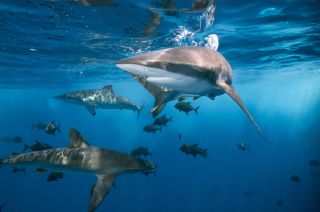Identity
The Real Reason Some Sharks Bite People
A more plausible, less scary explanation.
Posted March 10, 2023 Reviewed by Davia Sills
Key points
- The Mistaken Identity Hypothesis posits that shark attacks on people occur because sharks confuse the appearance of people and prey, like seals.
- This hypothesis has been accepted as fact by the general public and some scientists, despite being unproven.
- A more plausible explanation for shark bites may be that sharks naturally explore their environment with their mouths.
- While most sharks are cautious, a few have bolder, risk-taking personalities that lead them to bite novel objects in their environments.
_(32749142772).jpg?itok=RIjCskyw)
You’ve probably heard of the "Mistaken Identity Hypothesis." The idea is that most shark bites on surfers and swimmers occur because of the visual similarity between people and sharks’ typical prey.
However, despite being widely accepted as fact by the general public and many scientists, the Mistaken Identity Hypothesis is exactly that: an unproven hypothesis.
In a new paper in the journal Behaviour, marine biologists Eric Clua and Carl Meyer take on the Mistaken Identity Hypothesis and propose what they say is a more plausible explanation for shark bites.
The researchers say this is more than just an argument about semantics. It impacts how people feel about sharks.
“If you believe that sharks make mistakes, every single shark in the water is a potential threat to humans,” says Clua. “That makes all sharks the problem when actually, we don’t have a problem with 99.99 percent of sharks.”
A Mistaken Explanation?
The Mistaken Identity Hypothesis was first proposed in 1974 by Henry David Baldridge. He noted that a person in a black wetsuit might look like a seal to sharks. It was a perfectly acceptable hypothesis, says Clua.
However, 10 years later, this hypothesis was repeated as fact in a paper by different scientists. From there, the Mistaken Identity Hypothesis entered the mainstream.
Clua says that as a student he was told that shark bites are the result of mistaken identity. But as he learned more about sharks and eventually became a shark behaviorist, he had more doubts about that explanation.
One major issue is that the Mistaken Identity Hypothesis assumes that a similar visual appearance is enough to confuse sharks and ignores the important role of other senses used in predation. Vision is one sense sharks may use, says Clua, but they also possess several other senses that may be more significant when discriminating prey.
“For sharks, there are two main senses that are critical for predation,” he says. “One is hearing, because sound travels quickly underwater, and the second is mechanoreception, the capacity of fish to analyze information about waves in the water.”
In fact, a recent study showed that the sounds made by paddling surfers are distinct from the sounds made by seals and turtles. Clua and Meyer say that given the array of sensory cues that sharks process, it is unlikely that they would mistake a human for a prey animal.
In addition, there are several lines of evidence that directly contradict the Mistaken Identity Hypothesis. Shark bites often happen in clear water, for example, and species of shark that do not take prey as big as seals sometimes bite people. Sharks also bite inanimate objects of various shapes, sizes, and colors with no resemblance to seals or other prey.

An Alternative Hypothesis
So, if sharks aren’t making mistakes, why do some bite people? Clua and Meyer propose a simple alternative that can explain not only shark bites attributed to the Mistaken Identity Hypothesis but also those that the hypothesis cannot explain.
The Natural Exploration Hypothesis states that sharks don’t make “mistakes” but instead continually explore their environments and routinely investigate novel objects as potential prey by biting them.
Sharks don’t teach their young about prey or hunting; individual sharks must use their senses to explore and learn predatory skills by themselves. And sharks have little choice but to use their mouths to learn more about unfamiliar objects.
That being said, shark bites on people are still incredibly rare. In 2022, there were a confirmed 57 unprovoked shark bites on humans and five unprovoked fatalities.
Clua is currently researching a factor that he thinks can explain why there are so few—but still some—shark bites on people: shark personalities. He says that sharks, like all vertebrates, have personalities with traits such as shyness/boldness and risk-taking/risk-avoiding. Although exploration is an important behavior for sharks, most individuals are naturally cautious in novel situations. Only a few bolder, risk-taking sharks will be likely to bite unknown items.
Clua is working to develop individual shark genetic profiling, an approach that would mirror the forensic science used to identify and catch human killers. He says this tactic may allow for the identification of specific sharks that have bitten people while leaving the majority of sharks alone. It’s a lofty goal, but it could prevent the indiscriminate killing of large numbers of sharks that pose no threat to humans.
Overall, the researchers say more work is needed to understand shark senses, personalities, and behavior to change the way people see these animals and gauge their risk when entering the ocean.
“I am now not the only one saying that we were mistaken in thinking that sharks are just mindless, instinctive animals,” says Clua. “Actually, we are learning they are more intelligent than we thought.”
Facebook/LinkedIn image: Martin Prochazkacz/Shutterstock
References
Clua, E. E., & Meyer, C. G. (2023). The ‘Mistaken Identity Hypothesis’ for shark bites on humans is an anthropomorphic fallacy, Behaviour (published online ahead of print 2023). doi: 10.1163/1568539X-bja10196.




